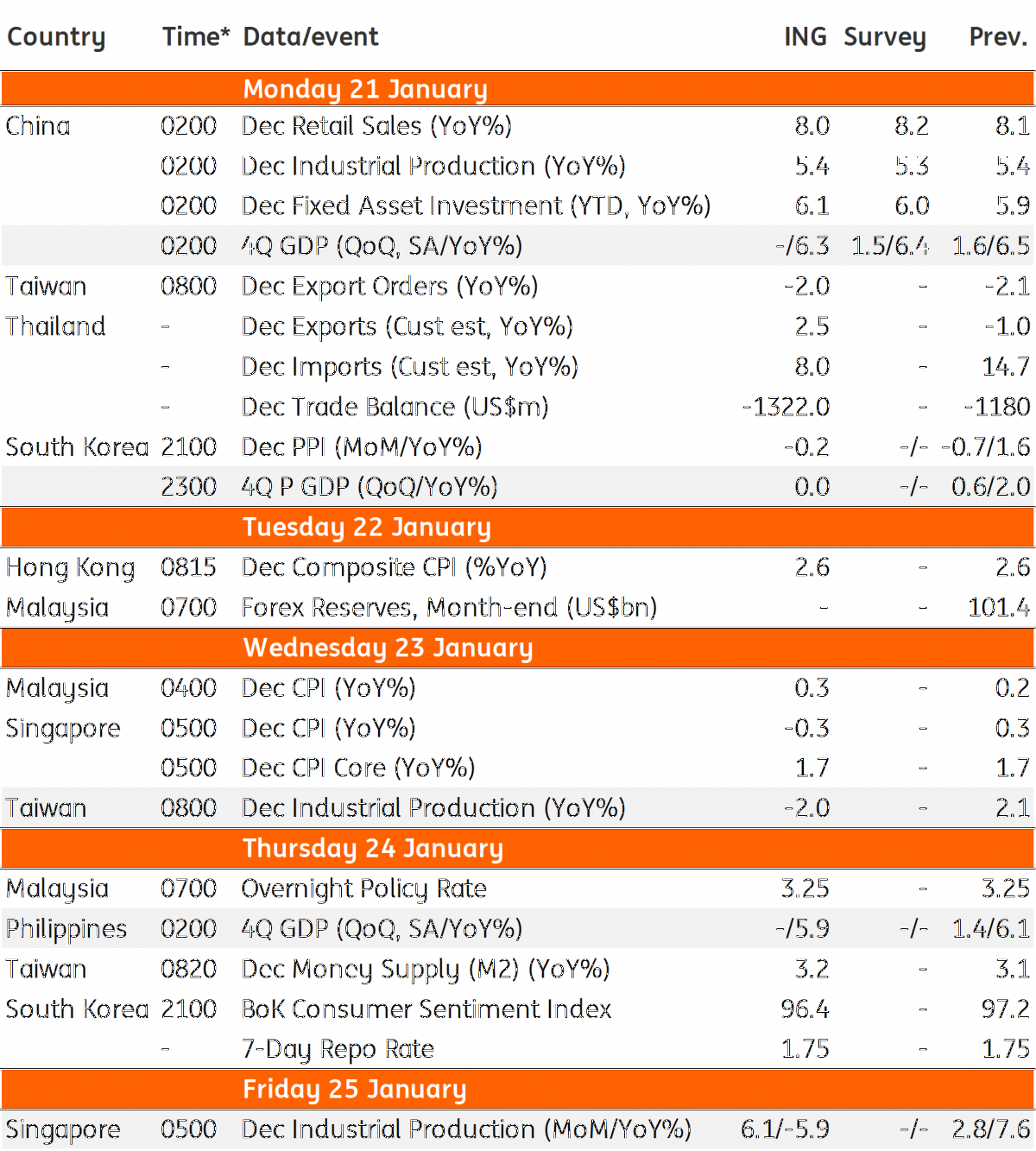Asia week ahead: Central banks to take cues from GDP
Central bank policy meetings and 4Q18 GDP reports dominate next week’s Asian economic calendar. Asian central banks will tread a cautious path but will mostly leave policies on hold this year
Downside risk to China’s growth
The week begins with China’s 4Q18 GDP and December data on retail sales, fixed asset investment, and industrial production. The consensus estimate of 6.4% year-on-year GDP growth is barely a slowdown from 6.5% in the previous quarter despite all the hue and cry that weighed down global markets in the last quarter. However, a sharp deceleration in manufacturing and retail sales as well as in trade growth, and falling industrial profits signal a downside risk to the consensus GDP estimate. Our house forecast is 6.3%.
Net trade seemed to have offset some of the slack in domestic spending. Although export growth slowed in the last quarter, import growth slowed by more than exports and the trade surplus widened from a year ago. Net trade subtracted from GDP growth in the first three quarters of 2018 but contributed to it in the final quarter.
China: What's driving GDP growth?

Asia’s GDP growth ends 2018 on weaker note
Korea and the Philippines also report GDP for 4Q18. As with China, we think consensus growth estimates -- 2.8% for Korea and 6.4% for the Philippines -- are subject to asymmetric downside risk (ING forecasts 2.1% and 5.9% respectively).
Singapore’s industrial production figures for December will indicate the direction of revision to the advance release of 4Q GDP estimate of 2.2%. It will certainly be downward given disappointing non-oil domestic exports in December. Likewise, Taiwan’s December IP data will help to fine-tune estimates of GDP growth in the last quarter.
More reasons for central banks to stay on hold in 2019
A weak end to one year makes it arithmetically harder for the following year to score well, underpinning our view that most Asian central banks will leave policies on hold this year, if not ease.
Central banks in Japan, Korea, and Malaysia meet next week. All are expected to remain on hold. Our interest lies in the Bank of Korea’s policy as the central bank also releases its quarterly Economic Outlook on the same day (24 January). In its October report, the BoK forecast 2.7% GDP growth for 2019, the same as its estimate for 2018. The 2018 growth forecast is unlikely to be met and the pace for 2019 looks to be far off in view of the global slowdown in the tech sector. As such, a downgrade to the BoK’s growth outlook for the current year shouldn’t come as surprise to anyone. However, we don't think this will move the central bank to reverse the December rate hike just yet.
Asia Economic Calendar

Download
Download article18 January 2019
Our view on next week’s key events This bundle contains {bundle_entries}{/bundle_entries} articles"THINK Outside" is a collection of specially commissioned content from third-party sources, such as economic think-tanks and academic institutions, that ING deems reliable and from non-research departments within ING. ING Bank N.V. ("ING") uses these sources to expand the range of opinions you can find on the THINK website. Some of these sources are not the property of or managed by ING, and therefore ING cannot always guarantee the correctness, completeness, actuality and quality of such sources, nor the availability at any given time of the data and information provided, and ING cannot accept any liability in this respect, insofar as this is permissible pursuant to the applicable laws and regulations.
This publication does not necessarily reflect the ING house view. This publication has been prepared solely for information purposes without regard to any particular user's investment objectives, financial situation, or means. The information in the publication is not an investment recommendation and it is not investment, legal or tax advice or an offer or solicitation to purchase or sell any financial instrument. Reasonable care has been taken to ensure that this publication is not untrue or misleading when published, but ING does not represent that it is accurate or complete. ING does not accept any liability for any direct, indirect or consequential loss arising from any use of this publication. Unless otherwise stated, any views, forecasts, or estimates are solely those of the author(s), as of the date of the publication and are subject to change without notice.
The distribution of this publication may be restricted by law or regulation in different jurisdictions and persons into whose possession this publication comes should inform themselves about, and observe, such restrictions.
Copyright and database rights protection exists in this report and it may not be reproduced, distributed or published by any person for any purpose without the prior express consent of ING. All rights are reserved.
ING Bank N.V. is authorised by the Dutch Central Bank and supervised by the European Central Bank (ECB), the Dutch Central Bank (DNB) and the Dutch Authority for the Financial Markets (AFM). ING Bank N.V. is incorporated in the Netherlands (Trade Register no. 33031431 Amsterdam).
